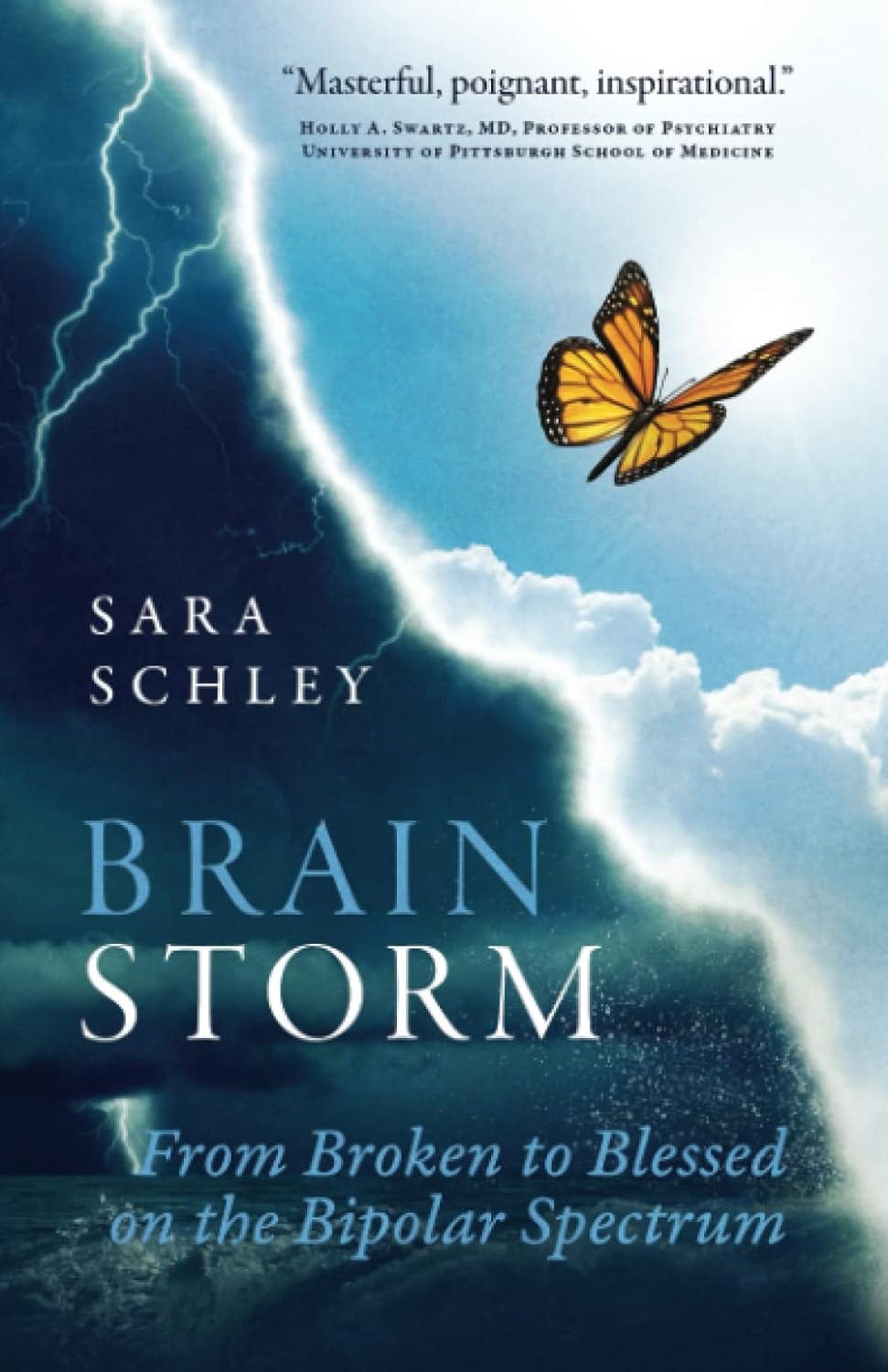Watch the show on television by downloading the e360tv channel app to your Roku, AppleTV or AmazonFireTV. You can also see it on YouTube.
When you purchase an item, launch a campaign or invest after clicking a link here, we may earn a commission. Engage to support our work.
Devin: What is your superpower?
Sara: I tend to just bless the heck out of people because it's genuine that I love them.
For today’s episode, I had the privilege of speaking with Sara Schley, a passionate author and filmmaker, about her compelling journey living with bipolar disorder. Sara deeply explores this topic in her upcoming documentary, BrainStorm the Film. Sara's story is not only inspiring but also a powerful beacon for change in the mental health landscape.
Sara explained how her personal struggles and the challenges she faced in obtaining the correct diagnosis led to her mission to "crush the stigma and maximize healing" for those living with bipolar disorder and their loved ones. Her film, BrainStorm, inspired by her own life experiences, aims to save lives by fostering a deeper understanding of bipolar disorder, which is often shrouded in misconception and stigma.
The key idea here is the profound impact that accurate diagnosis and appropriate treatment can have on individuals with bipolar disorder. Sara shared, "It took me 25 years and five psychiatrists to finally get the diagnosis that saved my life." This statement highlights the critical need for improved awareness and knowledge among both the public and healthcare professionals about the bipolar spectrum, which includes conditions that do not necessarily present with extreme mania.
Further, Sara illuminated how the film weaves together powerful stories from individuals like herself and cutting-edge science to portray the reality of living with bipolar disorder. This integration of personal narratives with scientific insights serves as a testament to the resilience and potential for recovery that can arise with correct diagnosis and treatment.
Living with bipolar disorder, as Sara poignantly described, can be a harrowing experience, especially when misdiagnosed. Her own journey of highs and lows, marked by periods of severe depression and cognitive dysfunction, underscores the necessity of destigmatizing mental health issues and promoting accurate medical responses.
Through BrainStorm, Sara aims to bring visibility to the experiences of those living with bipolar disorder, encouraging a more empathetic and informed approach to mental health that transcends mere labels. Her work not only aims to educate but also to empower individuals and their families to seek help and advocate for proper care.
As we wrapped up this episode, Sara's message was clear: understanding and treating bipolar disorder can dramatically change lives, turning despair into hope and dysfunction into stability. Her dedication to this cause is a vivid reminder of the power of resilience and the importance of compassion in the face of mental health challenges.
AI Episode Summary
1. Introduction of Sara Schley: The show features Sara Schley, an author and filmmaker with a focus on helping others understand bipolar disorder, aiming to correct misconceptions.
2. Sara's Upcoming Film: Sara discusses her documentary Brainstorm the Film, inspired by her life story with bipolar disorder. The film highlights the journeys and challenges toward diagnosis and acknowledgment of the condition.
3. Distinguished Guests in "Brainstorm": General Gregg Martin and Devika Bhushan, notable figures sharing their experiences with bipolar disorder, are mentioned as significant contributors to the film's narrative.
4. Challenges Before Diagnosis: Sara shares personal hardships faced before proper diagnosis, describing her struggles with cognitive function, depression, and the overwhelming sense of fear.
5. The Road to Proper Diagnosis: After years of misdiagnosis, Sara emphasizes the life-changing impact of receiving the correct diagnosis and appropriate treatment for bipolar disorder, transforming her quality of life.
6. Entrepreneurs and Bipolar Disorder: An interesting link is explored between entrepreneurship and a higher occurrence of bipolar disorder, suggesting a correlation between the condition's characteristics and entrepreneurial traits.
7. Sara's Superpowers: Sara identifies her personal superpowers as emotional fearlessness, discipline, compassion, and gratitude, attributing them to her experiences living with and managing bipolar disorder.
8. The Importance of Compassion: Sara delves into how her bipolar disorder has fostered profound compassion, assisting her in being a neutral and supportive figure in conflict situations and emphasizing non-judgmental attitudes.
9. Accessing Sara's Work and Support: Information on how to find Sara's book BrainStorm, engage with the upcoming film, and join the community for support and updates is provided, alongside an announcement of a forthcoming podcast.
10. Closing Remarks and Encouragement: The host thanks Sara for her contribution and emphasizes the significance of her work in changing perceptions around bipolar disorder, wishing her continued success in her endeavors.
How to Develop Compassionate Leadership As a Superpower
In today's episode, I explored the unique qualities that Sara brings to her work and advocacy. As someone who has navigated the challenges of living with bipolar disorder, she has developed a profound sense of compassion, discipline, gratitude, and emotional fearlessness. These attributes are not just survival mechanisms but have become superpowers in their own right, enabling her to lead with empathy and inspire others in her projects and advocacy work.
One illustrative story that Sara shared revolves around her role within the B Corp community. She founded a network of B Corp women CEOs, which grew to include 300 members. During meetings, conflicts would sometimes arise, and Sara often found herself as the mediator. Her ability to empathize with all parties and find a third way that honors everyone's perspectives allowed her to defuse conflicts effectively. This skill of compassionate mediation has been pivotal in maintaining harmony and fostering inclusive dialogue within the community.
To develop this superpower of compassionate leadership, Sara suggests several actionable strategies: maintain a disciplined daily routine that promotes mental and physical health; practice gratitude for your capabilities each day; cultivate emotional fearlessness by facing personal challenges head-on; and develop the ability to empathize without being overwhelmed by others' emotional states, turning empathy into proactive compassion.
By following Sara's example and advice, you can make compassionate leadership a skill. With practice and effort, you could make it a superpower that enables you to do more good in the world.
Remember, however, that research into success suggests that building on your own superpowers is more important than creating new ones or overcoming weaknesses. You do you!
Guest Profile
Sara Schley (she/her):
Filmmaker and Author, BrainStorm the Film
About BrainStorm the Film: Inspired by the book BrainStorm: From Broken to Blessed on the Bipolar Spectrum, Sara Schley’s searing memoir, BrainStorm the Film is a full-length broadcast documentary that will transform the landscape around bipolar as we know it. The word bipolar conjures up images of wild highs, delusions, all-night sprees, and sudden mood crashes. But this manic-depressive behavior, known as bipolar I, exists only at one extreme end of what we now know as the bipolar spectrum. People whose brains fall elsewhere on the spectrum — bipolar II and others — experience severe, life-threatening depression, but do not exhibit classic mania. Since bipolar II depression can look like unipolar depression, misdiagnosis is rampant. In fact, one out of four people diagnosed with depression actually have a bipolar brain – and the antidepressant drugs they are prescribed can lead to dangerous and even lethal consequences. This unprecedented documentary will present the latest scientific research around the underlying causes of bipolar, diagnostic techniques, and innovative treatments. We will feature a cast of compelling characters living with bipolar whose inspiring stories bring life to the science. By including their stories, the film will highlight the “silver lining” of bipolar – extraordinary creative and entrepreneurial talents – in addition to presenting those who struggle with getting an accurate diagnosis and effective treatment. We will also include innovative programs that provide alternative delivery mechanisms for care and combat stigma and shame. Finally, by focusing on breakthrough treatments on the horizon and wellness practices that people with bipolar can embrace right now, the film will offer practical tools to the millions of people suffering from bipolar and offer hope for them and their loved ones.
Website: www.brainstormthefilm.com
Linkedin Page: linkedin.com/company/brainstorm-the-film/
Linkedin Profile: linkedin.com/in/saraschley/
Instagram Handle: @brainstormthefilm
Upcoming SuperCrowd Event Calendar
If a location is not noted, the events below are virtual.
Impact Cherub Club Meeting hosted by The Super Crowd, Inc., a public benefit corporation, on May 14, 2024, at 1:00 PM Eastern. Each month, the Club meets to review new offerings for investment consideration and to conduct due diligence on previously screened deals. To join the Impact Cherub Club, you must first become an Impact Member of the SuperCrowd.
SuperCrowdHour, May 15, 2024, at 1:00 Eastern. Each month, we host a value-laden webinar for aspiring impact investors or social entrepreneurs. At this month’s webinar, Bill Huston will share “Unleashing the Power of Crowdfunding for Affordable Housing.” Register here.
SuperCrowdChicago, June 12, 2024. This in-person event at Columbia College Chicago features some of Chicago’s prominent citizens and community leaders, along with crowdfunding experts. Use the discount code “SuperCrowd” to save 30 percent!
Recently, we created an AI GPT to help you learn more about The Super Crowd, Inc., a public benefit corporation, and our upcoming events. Click here to try it.
SuperCrowd Community Event Calendar
AMIBA: 21-Day Racial Equity Habit-Building Post-Challenge, May 9, 1:00 PM ET
Crowdfunding Professional Association Webinar, May 29, 2:00 PM ET
The Reg A & Crowdfunding Conference, June 20, Westchester Country Club (Save 20% with the code Super20)
Crowdfunding Professional Association, Summit in DC, October 22-23
If you would like to submit an event for us to share with the 4,400+ members of the SuperCrowd, click here.
We use AI to help us write compelling recaps of each episode.

















